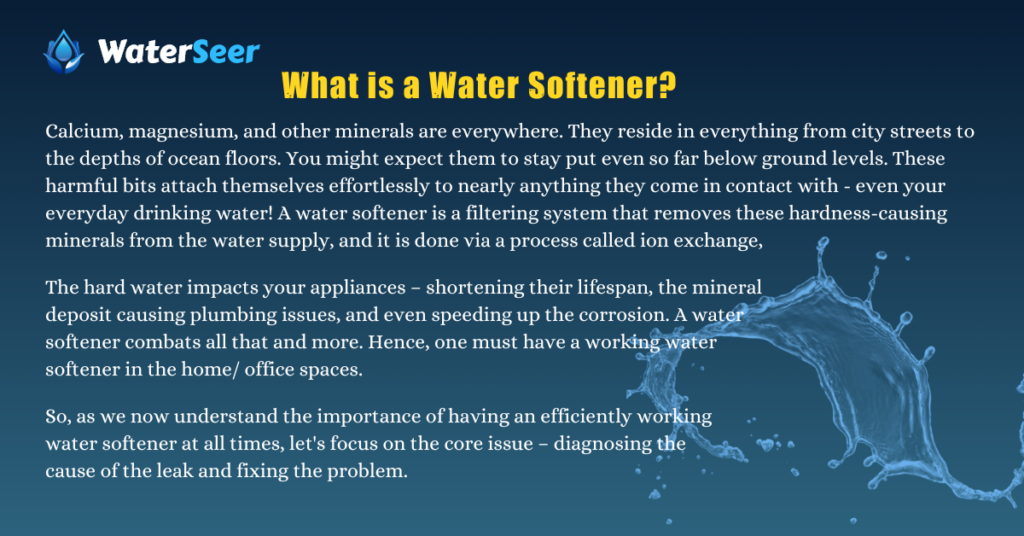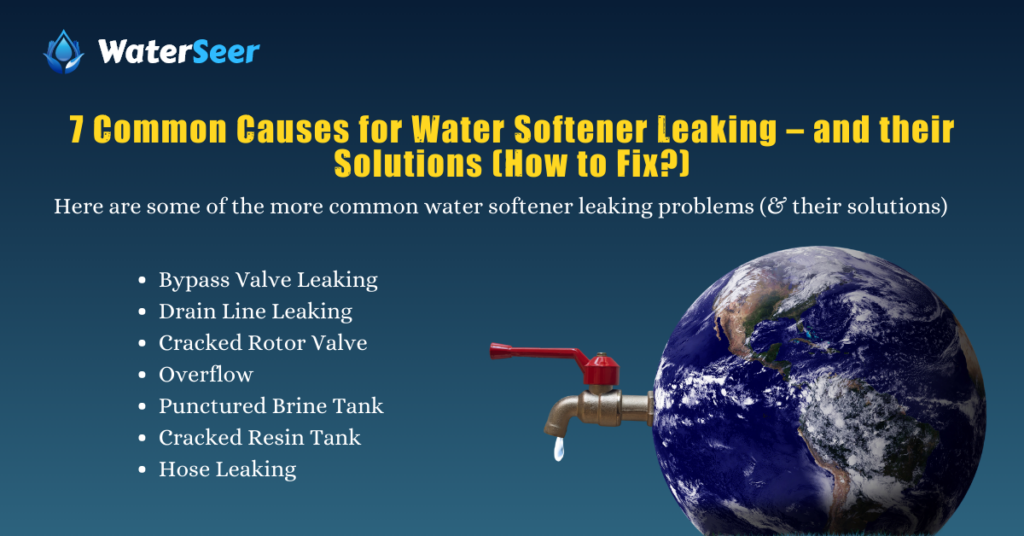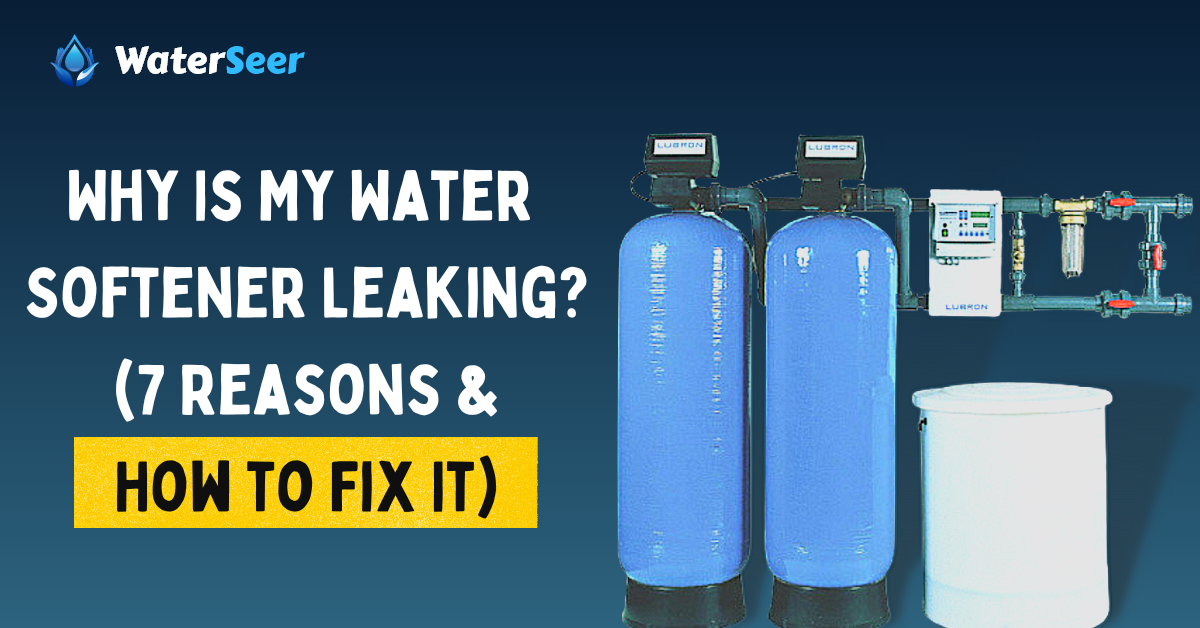Your water softener is supposed to make your drinking water softer and less acidic, which is good news for your pipes. But if your water softener keeps leaking, you might wonder what’s going on and how you can fix it.
That’s because a leaky water softener isn’t just a hassle; it can also be dangerous. A loose fitting or malfunctioning seal that allows the salt to get into the home through the plumbing is likely to increase the risk of bacterial growth in your home. Not only that, but a leaky water softener will waste your money by using salt you don’t need.
So, one must fix their water softener leak issue as soon as possible. Let us explore some common reasons why your unit might be causing leaks and some quick fixes you can try if that’s the case.
But first, let’s understand what a water softener actually is.
What is a Water Softener?

Calcium, magnesium, and other minerals are everywhere. They reside in everything from city streets to the depths of ocean floors. You might expect them to stay put even so far below ground levels. These harmful bits attach themselves effortlessly to nearly anything they come in contact with – even your everyday drinking water! A water softener is a filtering system that removes these hardness-causing minerals from the water supply, and it is done via a process called ion exchange.
The hard water impacts your appliances – shortening their lifespan, the mineral deposit causing plumbing issues, and even speeding up the corrosion. A water softener combats all that and more. Hence, one must have a working water softener in the home/ office spaces.
So, as we now understand the importance of having an efficiently working water softener at all times, let’s focus on the core issue – diagnosing the cause of the leak and fixing the problem.
Can a Water Softener Leak, and How Can One Diagnose the Problem?
Yes, a water softener can leak, which is not uncommon. In most cases, it is a minor leak, which is not a cause for concern. However, it is a ‘big leak‘; it can be a serious issue and needs immediate action to rectify the situation.
Luckily, the good news is that leaks in water softeners are pretty easy to diagnose.
- In case of a leak, one can easily find water forming a puddle just beneath the installed water softener unit. It is often the first indicator that something is wrong with the device.
- Alternatively, you will also observe that the flow of the water/ regeneration is affected – most likely slowed down. It is because less water is present for the treatment due to the leakage.
If you spot any of these two signs, you have a water softener leakage issue.
7 Common Causes for Water Softener Leaking – and their Solutions (How to Fix?)

Water Softener Leakage is more common than one might think. And most of the causes behind such a leak can be easily diagnosed and tackled. You might not even need to hire a professional handyperson to assist you. However, it is still recommended that if you cannot diagnose the issue, you reach out to a professional to handle this job.
Here are some of the more common water softener leaking problems (& their solutions):
1. Bypass Valve Leaking
It would not surprise anyone remotely familiar with the plumbing system. A leak because of the Bypass valve is common, and the same is true in water softeners.
The O-Rings in the water softener system have a lifespan, after which they become too worn out to be used effectively. One can manage it if one has been lubricating their system’s O-Rings regularly (a properly lubricated O-Ring lasts anywhere between 15 to 20 years). But if that is not the case, then the Bypass Valve leaking is bound to happen.
The solution for this is also pretty simple – you would need to replace the Bypass Valve immediately; there is no getting around to it. A water softener cannot function if there is an issue with the water supply mechanism.
Luckily, replacing the Bypass Valve requires no special training and is something you can do yourself. However, you must ensure that the replacement O-ring is the same size and perfectly fits the system.
2. Drain Line Leaking
Drain Line Leaking is another common reason behind the water softener leaking. Drain lines can be installed incorrectly or become cracked and leak over time. Ensure the drain line has enough air gap distance for protection and is installed correctly.
If it was done correctly, rule out the possibility of an improper installation. A small trickle of water from the drain line means there is either a crack somewhere down the line or another clogged pipe — check both ends to determine what needs fixing. If you can spot the issue and it is possible for you to repair it, then do so immediately.
Remember, this is a huge problem & needs attention as soon as possible. If you ever notice it happening again, your repair work has not worked correctly, and you should immediately reach out to a professional.
3. Cracked Rotor Valve
Arguably the most common reason behind the water softener leakage is a cracked rotor value. The water softener uses the rotor valve to distribute water throughout the system. Over time, it can wear down until small cracks form – potentially leading to leaks. The majority of the water softener leakage issue happens because of this reason.
If your original rotor valve isn’t worn out and only its seal needs replaced instead, then that’s what you’ll want to order, which will cost you around $50 to $70 for the complete kit.
You can find these parts online but contact the company that makes them first if you’re unsure about compatibility before ordering anything from elsewhere. You can also connect with a plumber who should be able to install everything properly!
4.Overflow
Another reason you may find the water softener leaking from the top is because of the overflow issue. You may have an overflow problem if you notice water leaking from your saltwater tank.
The float valve should tell the water where to go by limiting how high it can rise up in the tank. Your float valve may have become faulty or misaligned – re-attach the float valve or replace it if needed. You should also inspect your pipes and valves to ensure they are not clogged up, as this could lead to overflowing levels in your brine tank.
5. Punctured Brine Tank
One of the more troubling reasons behind the water softener leakage is the puncture in the brine tank. A leaking water softener usually has something to do with the broken brine tank. Ironically, you may have caused this issue while trying to clear a salt bridge – if you hit it hard enough. It’s tempting for people to take out their frustrations on the salt bridge when they try to remove it, but doing so can cause leaks in the tank (and elsewhere).
There are temporary fixes that might keep your water softener going until you replace the broken parts of your system. However, the entire tank will eventually need replacing if you want to avoid further damage.
Suppose there is already a leakage, and your new water softener was installed less than three months ago. In that case, it is possible that you’ve gotten a faulty product from your manufacturer/supplier. Your warranty should indicate whether or not you’re eligible for a replacement piece – be sure to call them first thing!
6. Cracked Resin Tank
Water may leak from older resin tanks through cracks or holes, causing the tank to rupture. Resin tanks can also crack as they age, which makes them more likely to occur. First things first, empty the tank and clean the tank thoroughly. After that, you can easily figure out exactly where the leak (or leaks) are coming from and will know how serious they are when repaired.
If they’re fixable at home, follow these easy steps:
- Buy epoxy that’s meant for smaller jobs – preferably one that has already been used by many other people who found success with it.
- Prepare any surfaces being repaired beforehand – keep in mind though not all surfaces will take well to be repaired.
If such is not the case, you might need to have a handyperson look at it or replace the cracked resin tank completely. It can be expensive and cost you upwards of $500 and more, especially if you have a quite old unit that has seen better days. It might even be better for you to purchase a new water softener system altogether.
7. Hose Leaking
If you think your hose is leaking, there are some things you can try. First, check the connection if you believe it is coming from the hose and see if it is coming directly from where it is connected. If it is, you can tighten it to see if that fixes the problem.
A worn-down hose may need more than just tightening up. In this case, replace the old one with a new one. Turn off power or water before making repairs to ensure safety and success.
These are the most common issues that one will find to be the reason behind their water softener leaking. If such is not the case, then it is very likely that you might need to replace the system altogether. However, it would be wise to connect with a technician who can review the system and find out whether you have missed something.
It is also advised you connect with the supplier to check whether the device is still under warranty or if there is something they can do to help you out.
Cost of Fixing the Water Softener Leak
As you might have already gathered, the answer to this question can be complicated. The answer primarily depends on what type of repair is required and their difficulty levels. One also needs to determine whether they are searching for a temporary measure or something a bit more permanent. All these factors play a critical role in determining how much it would cost the owner of the said system for leak repair.
In most cases, the cost would be somewhere between $5 to $10, as most often than not, the problem can be fixed by replacing the O-Rings, or by using epoxy. Also, in most of these cases, you would be able to handle the task yourself without needing to hire a professional to assist you.
If your water softener is in the warranty period, then you can reach out to the supplier and have them fix the issue. It is crucial that you do so, as most manufacturers have specific clauses in their warranty terms that would void their obligation if the device was serviced by unauthorized personnel.
When in Doubt, Call the Professional
It is a tip that we cannot emphasize enough. If you are not sure what is the reason behind the leak of your water softener, please connect with a professional to diagnose the issue. You can easily find hundreds of water leakage specialists in your area just with a simple Google search. Hire them to help you out.
Also, if you are unsure whether you would be able to handle the repair of the device yourself, then connecting with an expert in such a situation is also recommended.
Frequently Asked Questions
Is it normal for the water softener to leak?
Yes, it is completely normal. It is sure to raise some eyebrows, as one would expect the best result from their devices, especially if they have paid a premium for them. Still, with regular use, these things are bound to happen. You do not need to worry, as most of these leaks can be handled without much effort.
When should one replace their leaking water softener?
Leaks, in most cases, do not require a complete system replacement. Still, if the brine tank or resin tank is leaking and your unit is old, it may make sense to spend money on a new water softener instead of buying an expensive new tank for the current one.
Also, if leaks are becoming more frequent across the board – no matter the cause for the same, then you’ll need to consider purchasing a new unit altogether.
How long does a water softener typically last?
Depending on the type and quality of water softener you buy, these appliances can last from 10-20 years before they are needed to be replaced. Depending on what kind of system you install at home, it may take 5-12 years for this machine to wear out. Remember, no appliance will last forever.
What is the optimal period of water regeneration?
It is generally accepted that regular regeneration cycles are beneficial for keeping the resin bed active. It should be done no less than every 48 hours, but high-efficiency softeners can do it as often as daily if needed.
Conclusion
Common problems can usually be solved without calling in a professional, except when they’re too difficult to handle on your own. Most homeowners will never need to call in a professional unless they notice a leak and want it fixed right away.
It’s always wise to get someone else involved when something isn’t working correctly. There’s no shame in asking another set of professionals for help when the first group couldn’t find the cause of your leaky water softener. So, it might cost you a bit more to connect with a professional, but it is worth the added expense!
| Check Out These Article |
|---|
| Water Filter Vs Water Softener: Know the Difference! |
| Water Conditioner Vs Water Softener: What’s The Difference? |
| Reverse Osmosis Vs Water Softener: Do I Need Both? |

